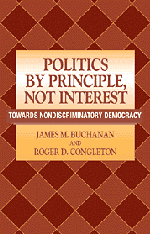Book contents
2 - Majoritarian democracy
Published online by Cambridge University Press: 27 March 2010
Summary
In reality, democratic politics is complex. We participate, directly or passively, in politics that we also observe, read about, and watch on our television screens. We confront an intricate and interlinked institutional jumble involving elections, candidates, referenda, parties, legislative bodies, executives, administrators, bureaucrats, regulations, decrees, mandates, program benefits, transfer payments, taxes, traditions, conventions, practices, and, of course, seemingly endless talk, almost always with a robust rhetoric of “public interest.” We tend to be overwhelmed by politics, as if it is too much with us, late and soon. Perhaps it is as well that we should be because politics controls almost half of the aggregate allocation of economic value in the United States and more than one-half in the welfare states of Europe.
The complexity of politics makes analysis aimed at genuine understanding difficult to commence. It is almost as if we ask the question: How do we analyze “the world?” The task of understanding must be tackled in small steps, in bits and pieces, and undertaken by those who specialize in separate scientific disciplines. By necessity, the enterprise is analogous to the fable in which several blind men feel the elephant with each one subsequently trying to understand the whole animal.
Historians try to identify major events in the political record, and they seek to discover causal forces, both human and nonhuman, that help us explain those events. Political scientists examine the formal and informal institutional structures of politics, and they try to understand the actual functioning of these structures. Public-choice economists are more individualistic in their methods.
- Type
- Chapter
- Information
- Politics by Principle, Not InterestTowards Nondiscriminatory Democracy, pp. 15 - 26Publisher: Cambridge University PressPrint publication year: 1998
- 4
- Cited by



